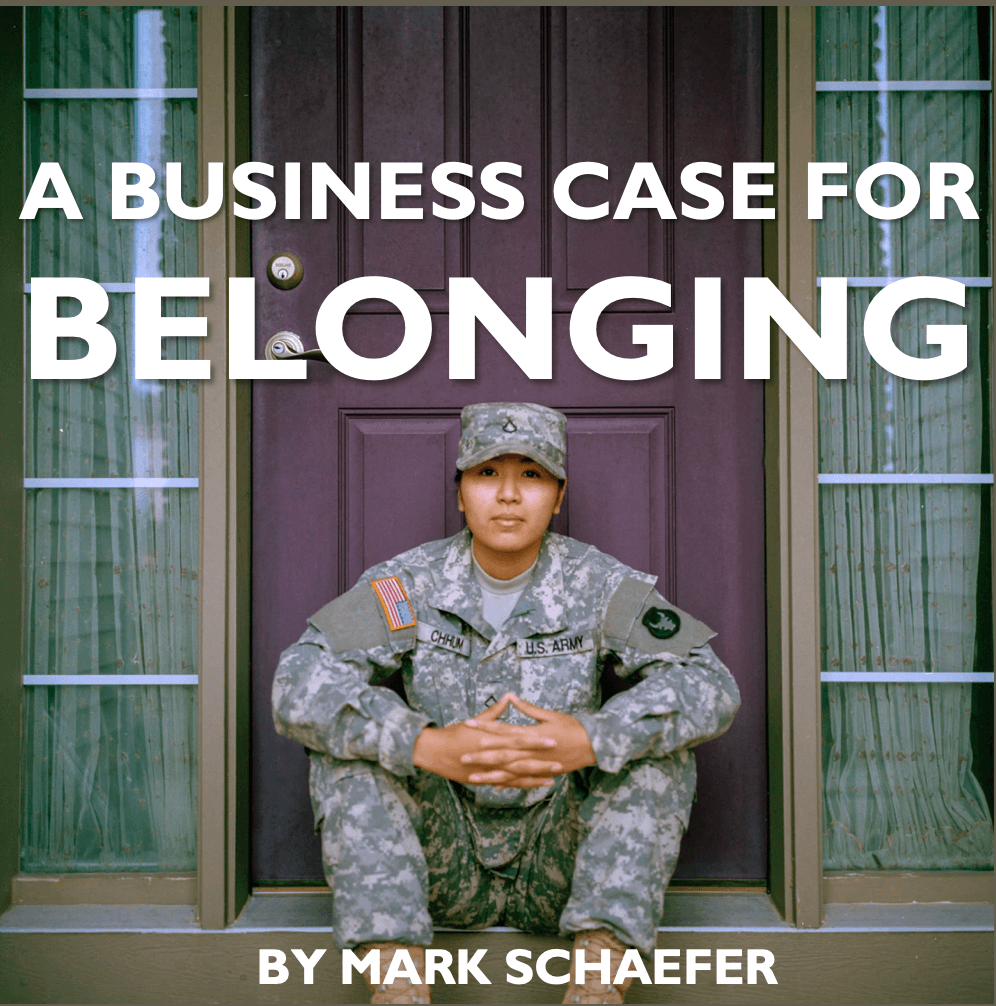
By Mark Schaefer
I’ve been thinking a lot about the role of “belonging” in business. The more I study it, the more I’m convinced this may be the most important new business trend in a decade. “The business case for belonging” might sound weird, but let me explain.
The employee side
I was talking to a young entrepreneur who has started a very successful software business. As you undoubtedly know, attracting and retaining tech talent in a small start-up like that can make or break a company.
But this entrepreneur looks out for his employees as much as his coding, and it’s paying off. His 10 employees have become a family of sorts. “Something interesting is happening,” he told me. “My employees are moving closer to our office. I think that is a sign of stability. They truly like each other and even hang out at our office after work to play video games with each other.”
My friend has had no turnover in four years, arguably his company’s greatest strength.
Belonging is a competitive advantage.
This is a new concept to me. Growing up in business at a large multinational company, I often felt like an interchangeable part. Today, I think belonging has to be a “thing” at almost any company … right up there with healthcare benefits and vacation plans. Not an easy thing to achieve.
The customer side
There is a belonging crisis in our world. The rates of isolation, depression, and suicide have doubled in a decade. One of the things I explored in my book Marketing Rebellion was whether companies could help people feel like they belong and address this longing.
I approached this very skeptically. In general, I think businesses grotesquely over-hype the role of “community” when it is really just a passive group of slightly-interested social media followers.
However, as I researched the subject, I changed my mind. Without question, companies are helping people truly feel they belong to a movement. There is an emotional attachment there that creates undeniable and long-lasting business benefits.
Research I presented in the book shows that when a company expresses shared values with customers it can lead to emotional attachment and strong loyalty.
As I wrote in my book, I’m concluding that “belonging” may be an emerging marketing strategy. People are crying out with loneliness. It is the un-met need of our age.
Everything starts with belonging
In my early teen years, I was a very lonely kid. I moved around to a couple of different schools and had a hard time breaking into the well-established cliques.
My freshman year of high school was particularly brutal. I moved into a private Catholic school where most of the kids had known each other since the first grade. There were cultish family bonds that formed walls around these teen tribes, and I was shunned as an outsider. I literally had no friends. I didn’t belong and I was miserable.
In the second semester of my freshman year, I tried out for the annual school play, a musical. It was a whim. I had never tried out for a play in my life.
When they posted the list of students and the casting assignments, dozens of kids gathered around the bulletin board to see who won the biggest roles. My name was at the very top of the list. I had won the lead role! Even though I was standing right there, everybody was looking around asking who Mark Schaefer was, a poignant reminder that I was literally invisible to these people.
But now I was leading a cast. For the first time in my life, I belonged to something. The other kids at school had no choice but to reckon with me as I excelled at the role in the play. My popularity soared. In later years, I was elected to student government and was president of the National Honor Society chapter.
There is no question that finding a way to belong unleashed something powerful in me. I was a whole new person. Would I be the man I am today if I had remained a lonely outsider for all of my high school years?
Belonging and business
I think you can take my little high school story and begin to see some implications for business, too.
- How would we unleash our own employees if they felt they truly belonged to our organization?
- How would employee health problems go down and productivity/retention go up if people came to work with a sense of purpose?
- Hyper-empowered consumers show little brand loyalty except when they feel they belong to something. Down the road, will “belonging” be the only marketing strategy we have left?
Pay attention to the number of articles you see in the business news that have something to do with brands taking a stand that create meaning, businesses placing purpose over profits, and customers rallying behind their favorite cause-based businesses.
Is there a blueprint for “belonging?” Probably not. It might mean something different at every organization and with every customer and employee.
But I do believe there is an emerging business case for belonging. Do you agree?
 Mark Schaefer is the chief blogger for this site, executive director of Schaefer Marketing Solutions, and the author of several best-selling digital marketing books. He is an acclaimed keynote speaker, college educator, and business consultant. The Marketing Companion podcast is among the top business podcasts in the world. Contact Mark to have him speak to your company event or conference soon.
Mark Schaefer is the chief blogger for this site, executive director of Schaefer Marketing Solutions, and the author of several best-selling digital marketing books. He is an acclaimed keynote speaker, college educator, and business consultant. The Marketing Companion podcast is among the top business podcasts in the world. Contact Mark to have him speak to your company event or conference soon.
Illustration courtesy Unsplash.com


